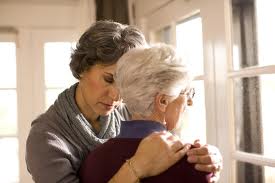 You may not have been following the news in China this past week, but China has enacted what may be the first law governing caregiving to older adults. In a law called the “Protection of the Rights and Interests of Elderly People” enacted this month caregivers are called to task. The law states “Family members living apart from the elderly should visit or send greetings to the elderly persons.” This is not what I would consider a very enforceable statute, but it is a sober statement about what caregivers and their older loved ones around the world are increasingly seeing with regards to geriatric care management.
You may not have been following the news in China this past week, but China has enacted what may be the first law governing caregiving to older adults. In a law called the “Protection of the Rights and Interests of Elderly People” enacted this month caregivers are called to task. The law states “Family members living apart from the elderly should visit or send greetings to the elderly persons.” This is not what I would consider a very enforceable statute, but it is a sober statement about what caregivers and their older loved ones around the world are increasingly seeing with regards to geriatric care management.
AARP and a group called the National Alliance for Caregiving (NAC) have been surveying caregivers since 1997 and an analysis across the years show some interesting trends:
- the average age of caregivers has been steadily increasing from 46 years old in 1997 to now 50 years;
- the percentage of caregivers who are women still outnumber men, but the numbers have declined from 73% women in 1997 to the most recent figure of 67% women (this has been generally consistent across caregivers of all ages)
- the average percentage of older recipients of care is growing – 24% of recipients 85 years of age and older to now 30% being that old or older;
- the proportion of caregivers who also hold a day job has been quite consistent during the years of these surveys (from roughly three in four to four in five caregivers employed);
- across all ages of caregivers there is an increasing incidence of leaves of absence from their jobs reported by caregivers
- “burden of care” measured in hours of caregiving as well as actual activities was measured only in the most recent survey, but it was the older caregivers reporting the greatest burdens;
- as a counterpoint to this “burden,” the older caregivers also were those most likely to use outside services to help in the caring (older caregivers also were less likely to report help from friends);
Getting back to our China example, the law does say “should.” But it just may be that the authorities were seeing some of the same trends as we see here in the United States. And this survey’s report pretty much squares with what I see as a geriatric care manager; older caregivers taking care of older friends or spouses shoulder a larger burden, and it ultimately takes its toll on the caregiver. If you know an older caregiver, help them to find resources to take some of the load off; remember also that a large portion of that “load” may be guilt about not going it alone…so be supportive.
Charlotte Bishop is a Geriatric Care Manager and founder of Creative Care Management, certified geriatric care management professionals who are geriatric advocates, resources, counselors and friends to older adults and their families in metropolitan Chicago. Please email your questions to ccbishop@creativecasemanagement.com.



